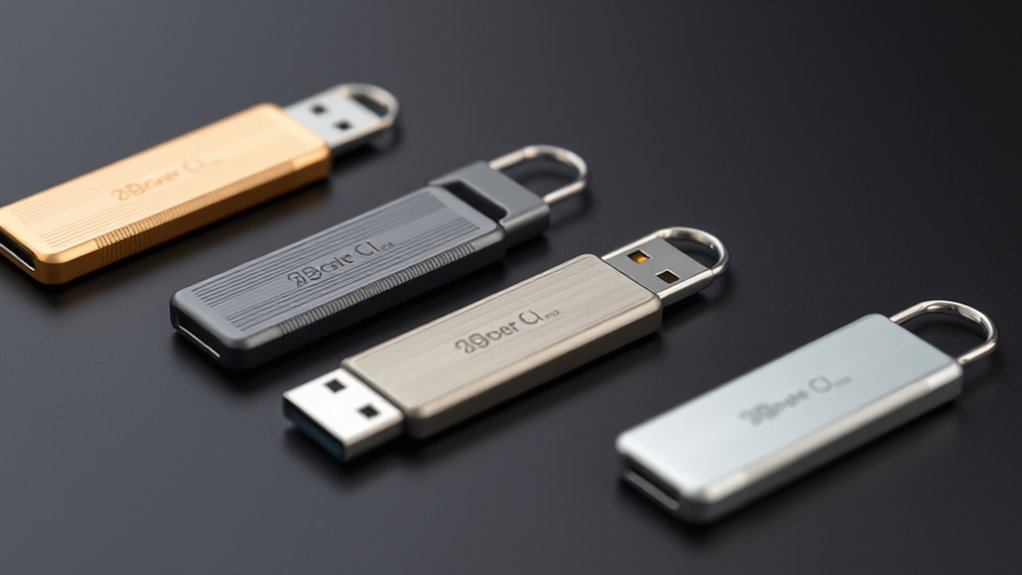If you’re aiming to protect your digital identity, I recommend looking into secure USB‑C hardware keys like Yubico’s Security Key C NFC, FEITIAN’s K44 and K39, and Thetis’ Pro and Nano-C models. These keys support protocols like FIDO2, U2F, and OTP, making them highly versatile and safe. They’re durable, easy to set up, and compatible across various platforms. Keep in mind your specific security needs and device compatibility—there’s a lot more to contemplate if you continue.
Key Takeaways
- Look for devices supporting FIDO2, U2F, and WebAuthn for strong, phishing-resistant authentication.
- Ensure compatibility with your device OS (Windows, macOS, Linux, Android, iOS) and connection type (USB-C, USB-A, NFC).
- Prioritize security features like hardware-rooted security, tamper resistance, and certified encryption standards.
- Consider durability features such as water, crush, and tamper resistance for long-term reliability.
- Check warranty and support options to ensure device longevity and effective account recovery.
Yubico Security Key C NFC (Black)
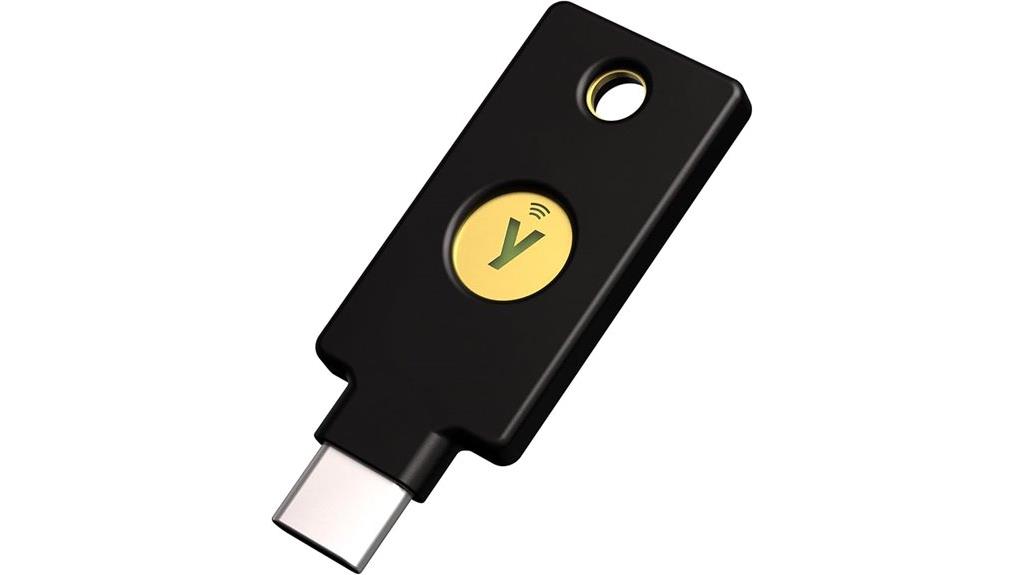
If you’re looking for a reliable and portable way to secure your online accounts, the Yubico Security Key C NFC (Black) is an excellent choice. It’s compact, durable, and supports USB-C and NFC for seamless authentication. Certified FIDO U2F and FIDO2, it requires physical possession to log in, protecting against phishing and social engineering. Setup is quick—just plug in or tap NFC-enabled devices. Compatible with major platforms like Google, Microsoft, and popular password managers, it’s ideal for high-security needs. Built to resist water, tampering, and crushing, this lightweight key offers peace of mind and robust protection wherever you go.
Best For: individuals and organizations seeking a durable, portable, and highly secure two-factor authentication device to protect their online accounts across various platforms.
Pros:
- Supports multiple authentication standards including FIDO2, U2F, OTP, and smart card functionalities for versatile security.
- Compact, lightweight, and built to resist tampering, water, and crushing, ensuring durability in diverse environments.
- Easy setup via USB-C or NFC, compatible with major platforms like Google, Microsoft, and popular password managers.
Cons:
- Higher cost compared to basic security keys, which may be prohibitive for some users.
- Some users report device-specific issues, especially on older Android tablets, affecting NFC operations.
- The need to use multiple keys as backups can complicate account recovery procedures.
SecuX PUFido USB-C Security Key with PUF Technology
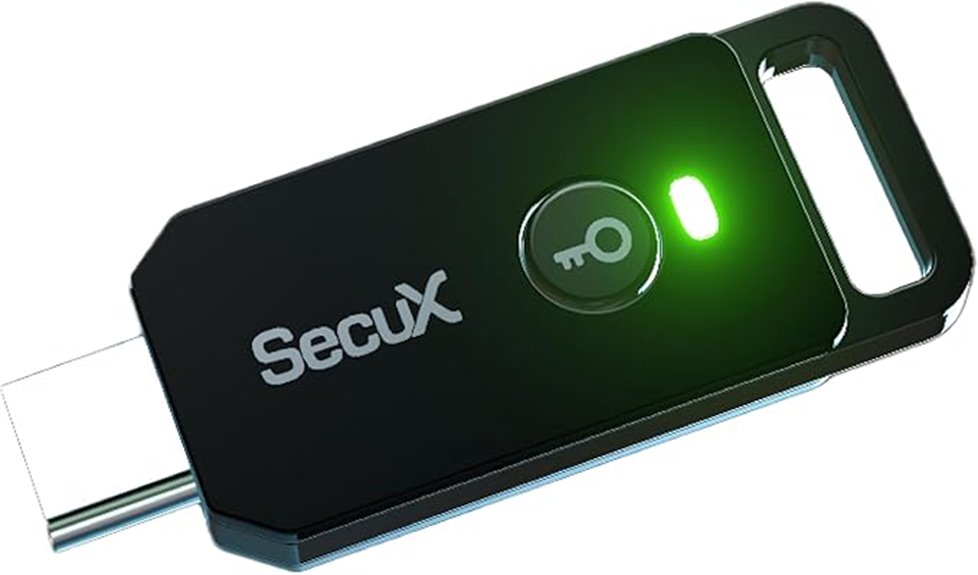
The SecuX PUFido USB-C Security Key with PUF technology is an excellent choice for anyone seeking high-level security that’s both tamper-resistant and easy to use. It uses PUF technology to create a hardware-rooted, unclonable trust anchor, resisting tampering and cyber attacks. Certified for FIDO2 and U2F, it offers phishing-resistant protection across many online services. Its compact USB-C design makes it portable and simple to authenticate with a quick plug-in. With passwordless login and 2FA, it substantially reduces risk from phishing or unauthorized access. Plus, attaching it to a keychain ensures you can carry security everywhere, with backup options available for continuous access.
Best For: individuals and professionals seeking high-security, phishing-resistant authentication for online accounts with portable, easy-to-use hardware.
Pros:
- Utilizes advanced PUF technology for hardware-rooted, unclonable security.
- Certified for FIDO2 and U2F, ensuring broad compatibility and high security standards.
- Compact USB-C design makes it easy to carry and attach to keychains for on-the-go use.
Cons:
- Requires compatible devices and services supporting FIDO2/U2F protocols.
- Backup options are recommended to prevent loss, which may involve additional setup.
- May be more expensive than basic security keys lacking hardware-rooted security features.
Thetis Pro FIDO2 Security Key, Two Factor Authentication NFC

Thetis Pro FIDO2 Security Key stands out as an ideal choice for users seeking versatile, hardware-based two-factor authentication that works seamlessly across a variety of devices. It supports FIDO 2.0 standards, offering authentication via NFC, USB-A, and USB-C, compatible with Windows, MacOS, Linux, Android, and some iOS devices. Its durable, tamper-resistant design features a metal cover, making it water- and crush-resistant. Setup is straightforward with Thetis Key Manager, and it allows up to 50 passkeys for managing multiple accounts. Compact and portable, it’s perfect for everyday security needs, providing reliable, password-free access across popular platforms.
Best For: users seeking a durable, versatile, hardware-based two-factor authentication solution compatible with multiple devices and platforms.
Pros:
- Supports FIDO 2.0 standards with NFC, USB-A, and USB-C for flexible authentication options
- Durable, tamper-resistant design with water- and crush-resistance, ideal for everyday carry
- Capable of managing up to 50 passkeys across various accounts for comprehensive security
Cons:
- Limited support for some iOS devices and specific services like ID Austria requiring higher FIDO2 levels
- Possible hardware durability issues such as USB-C port breakage, though replacements are available
- Requires installation of Thetis Key Manager and initial setup steps may be complex for some users
Thetis Nano-C FIDO2 Security Key with USB Type C
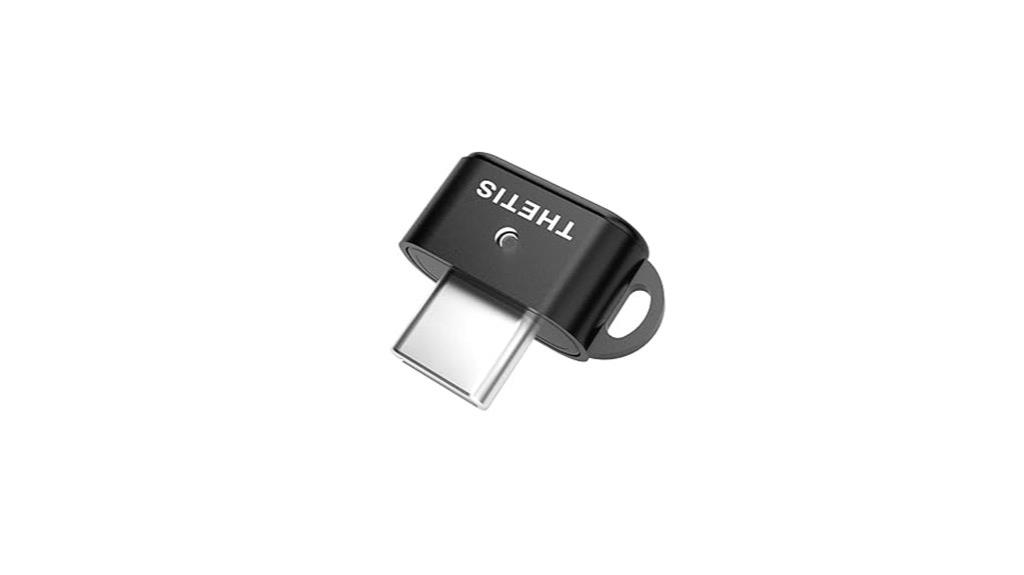
Designed for users who prioritize portability and broad device compatibility, the Nano-C FIDO2 Security Key with USB Type-C offers a compact, durable solution for securing accounts across multiple platforms. Its small size, aluminum casing, and USB-C interface make it highly portable and easy to carry, attaching effortlessly to keychains or pockets. Compatible with Windows, macOS, Linux, Android, and iOS without adapters, it supports major services like Gmail, GitHub, and Dropbox. Certified by FIDO and supporting standards like WebAuthn and CTAP2, it enables passwordless login and manages multiple passkeys and TOTP codes. Setup is quick and simple, providing reliable, standards-compliant security wherever you go.
Best For: users seeking a compact, cross-platform security key for easy, passwordless authentication across multiple devices and services.
Pros:
- Highly portable with a durable aluminum casing and tiny size, ideal for on-the-go use.
- Compatible with Windows, macOS, Linux, Android, and iOS without needing adapters.
- Supports a wide range of standards (FIDO2, WebAuthn, CTAP2, U2F, TOTP, HOTP) for versatile security options.
Cons:
- May require proprietary software for device management, adding extra steps for some users.
- Some services like ID Austria demand higher security levels, limiting its universal applicability.
- Users with non-USB-C ports may need adapters to connect the device.
Thetis Pro FIDO2 Security Key Passkey with Complex Pin

If you’re seeking a highly secure hardware key that offers advanced physical protection, the Thetis Pro FIDO2 Security Key with Complex PIN is an excellent choice. It features dual USB-A and USB-C connectors, making it versatile for desktops, laptops, tablets, and mobile devices, with NFC support for wireless authentication on Android and iPhone. Certified with FIDO standards, it supports passwordless login and multi-factor authentication using PIV, TOTP, and HOTP. Its standout feature is the PinPlex complex PIN system, providing an extra layer of physical security. Overall, it combines robust protection with flexible connectivity, ideal for both enterprise and personal use.
Best For: individuals and organizations seeking a highly secure, versatile hardware security key with advanced physical protection and multi-device compatibility.
Pros:
- Supports multiple connectivity options including USB-A, USB-C, and NFC for flexible device use
- Certified with FIDO standards for strong, passwordless, multi-factor authentication
- Features the PinPlex complex PIN system for enhanced physical security
Cons:
- Not compatible with ID Austria (requires FIDO2 Level 2)
- Windows Hello login limited to Enterprise edition with Entra ID
- Compatibility with some platforms should be verified prior to purchase
Clife USB-C Security Key for Passwordless Login

Clife USB-C Security Key is an excellent choice for organizations and individuals seeking strong, passwordless login options across multiple devices. It’s FIDO2 certified and supports WebAuthn 2.0, CTAP1, and CTAP2 protocols, enabling secure, password-free access with multi-factor authentication. Its USB-C interface guarantees broad compatibility with Windows, macOS, Linux, Android, Chrome OS, and iOS (iPhone 15+). Seamlessly integrating with providers like Microsoft, Google, Okta, and AWS, it’s perfect for diverse environments. Built for easy plug-and-play use, it encrypts private keys with advanced cryptography, preventing phishing and man-in-the-middle attacks, making it a reliable security upgrade.
Best For: organizations and individuals seeking a secure, passwordless login solution compatible with multiple devices and operating systems.
Pros:
- Supports FIDO2, WebAuthn 2.0, CTAP1, and CTAP2 protocols for versatile authentication options
- Compatible with a wide range of platforms including Windows, macOS, Linux, Android, Chrome OS, and iOS (iPhone 15+)
- Ensures high security with encrypted private keys and protection against phishing and man-in-the-middle attacks
Cons:
- Requires USB-C port, limiting compatibility with older or legacy devices without this interface
- May involve additional costs for deployment in large organizations or for individual users purchasing multiple units
- Dependence on device and platform support, which could require updates or configuration for certain environments
GoTrust Idem Key C NFC & FIDO2 Security Key (USB-C, Waterproof, Passwordless Login)
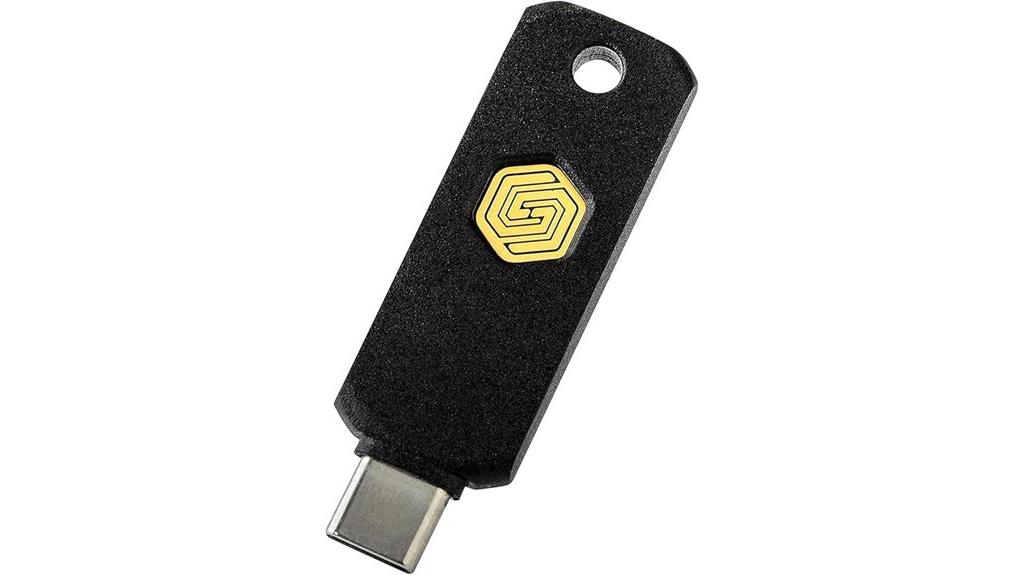
The GoTrust Idem Key C NFC & FIDO2 Security Key is an ideal choice for organizations and individuals who need rugged, enterprise-grade security in demanding environments. It features NFC and USB-C connectivity supporting multi-protocol authentication, including FIDO2 Level 2 certification, U2F, OTP, and smart card standards. Built with a FIPS 140-2 Level 3 secure element, it offers high-security protection against tampering and credential theft. Its IP68 waterproof, tamper-proof, and crush-resistant design ensures durability in challenging settings like hospitals, schools, and government facilities. The device supports instant plug-and-play use across multiple platforms and browsers, enabling passwordless login for enhanced security and convenience.
Best For: organizations and individuals requiring rugged, enterprise-grade security solutions for demanding environments like hospitals, schools, and government facilities.
Pros:
- Supports multiple authentication protocols including FIDO2, U2F, OTP, and smart card standards for versatile security options.
- Built with a FIPS 140-2 Level 3 certified secure element, ensuring high-level tamper resistance and credential protection.
- Waterproof (IP68), tamper-proof, and crush-resistant design offers durability in harsh environments.
Cons:
- Setup instructions and website support may be limited, potentially causing initial configuration challenges.
- Some users find the device’s feel to be flimsy or less premium than expected.
- Compatibility and support for certain platforms or services might require additional configuration or updates.
iShield Key Pro Security Key (USB-A/NFC)
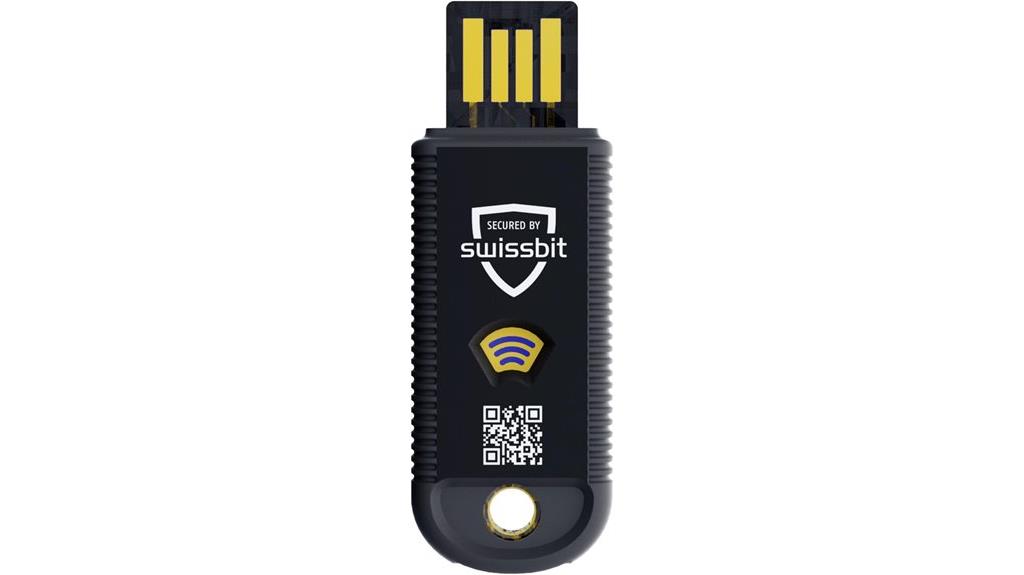
The iShield Key Pro Security Key (USB-A/NFC) is an ideal choice for users seeking a versatile, durable hardware authentication device that works seamlessly across a wide range of services and operating systems. It supports USB-A and NFC connections, enabling quick, plug-and-play setup for two-factor and passwordless login on platforms like Google, Microsoft, Facebook, Dropbox, and more. Compatible with Windows, macOS, Linux, iOS, Android, and browsers such as Chrome, Firefox, Edge, and Safari, it employs industry standards like FIDO2, PIV, HOTP, and TOTP. Its rugged design withstands extreme temperatures, making it reliable for everyday use. Overall, it combines security, convenience, and portability in a compact package.
Best For: users seeking a durable, versatile security key for seamless two-factor authentication and passwordless login across a wide range of services and devices.
Pros:
- Supports multiple authentication standards including FIDO2, PIV, HOTP, and TOTP, ensuring broad compatibility.
- Durable, waterproof design capable of operating in extreme temperatures for reliable everyday use.
- Easy to set up with plug-and-play USB-A and NFC connectivity, compatible with numerous operating systems and browsers.
Cons:
- Some users have reported difficulty due to the absence of a German manual, impacting non-English speakers.
- Limited to USB-A and NFC connections, lacking newer USB-C options for future-proofing.
- Customer ratings of 4.1 out of 5 suggest some users may experience occasional usability or compatibility issues.
FEITIAN K44 Dual-Connector iOS USB Security Key

If you’re looking for a highly versatile security key compatible with both iOS devices and multiple platforms, the FEITIAN K44 Dual-Connector iOS USB Security Key is an excellent choice. It supports FIDO U2F, FIDO2, PIV, and MFi certifications, making it compatible with iPhones, iPads, Windows, macOS, Linux, Android, and Chrome OS. Its dual connectors—USB-C and Lightning—allow seamless use across various devices. Built for durability with a sleek design, it supports passwordless login and stores up to 100 credentials. While some users encounter setup challenges on iOS, overall, it’s a reliable, high-security option suitable for personal and enterprise use.
Best For: users seeking a versatile, high-security security key compatible with multiple devices and platforms, including iOS, Android, Windows, macOS, Linux, and Chrome OS.
Pros:
- Supports multiple authentication standards including FIDO U2F, FIDO2, and PIV for broad compatibility and security.
- Dual connectors (USB-C and Lightning) for seamless use across various devices.
- Certified FIPS 140-2 Level 2 and supports passwordless login, ensuring high security standards.
Cons:
- Some users experience setup challenges and limited functionality on iOS devices.
- Troubleshooting device recognition and responsiveness can be complex.
- Limited user feedback on long-term durability and customer support responsiveness.
FEITIAN K39 USB Security Key with FIDO2

For anyone seeking a reliable, portable security solution, the FEITIAN K39 USB Security Key with FIDO2 offers robust two-factor authentication without the need for drivers or complex setup. Its USB-C connection makes it compatible with a wide range of devices, including computers, laptops, tablets, and smartphones supporting USB-C. Certified for FIDO2 and FIDO U2F, it works seamlessly with services like Google, Microsoft, Facebook, and many others. Built with a durable, water-resistant IP67 design, it’s compact and lightweight, perfect for daily use. With straightforward plug-and-play functionality, the K39 enhances your digital security effortlessly, making it an excellent choice for personal and enterprise protection.
Best For: individuals and organizations seeking a durable, easy-to-use USB-C security key for seamless multi-platform two-factor authentication.
Pros:
- No driver installation required; plug-and-play compatibility with multiple operating systems
- Robust, water-resistant IP67 design for durability and everyday use
- Broad support for popular services like Google, Microsoft, Facebook, and more
Cons:
- Customer ratings are moderate, with some users noting varying experiences
- Limited to USB-C devices, which may exclude some users with other port types
- Small size could be easy to lose or misplace during daily use
FEITIAN K28 USB Security Key with FIDO2
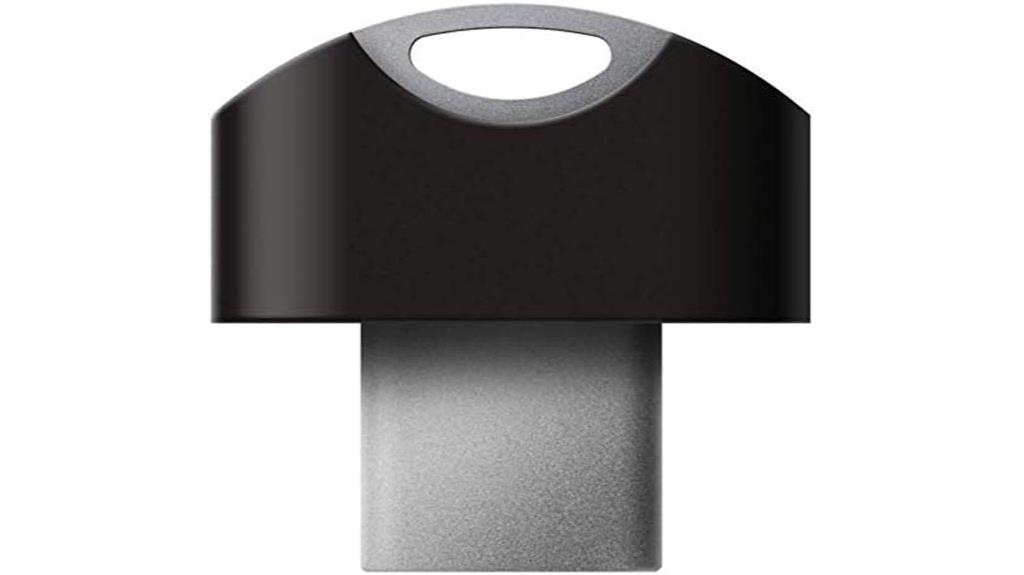
Anyone looking for a compact, portable security key that works seamlessly across multiple devices and browsers will find the Feitian K28 with FIDO2 an excellent choice. This micro-sized USB-C device supports desktops, laptops, tablets, and Android devices without needing drivers. Certified by FIDO2 and U2F, it safeguards accounts on platforms like Google, Microsoft, Facebook, Dropbox, Coinbase, and more. Its low-profile design minimizes intrusion, making it perfect for on-the-go security. With support for various protocols and credentials, it offers strong protection against phishing and cyber threats. While some users note limited storage and software complexity, its affordability and ease of use make it a solid option for multi-account security.
Best For: users seeking a compact, portable security key compatible with multiple devices and browsers for enhanced account protection.
Pros:
- Supports a wide range of platforms and services, including Google, Microsoft, Facebook, and more
- Compact, lightweight design ideal for portability and on-the-go use
- Easy to register and activate authentication by pressing the device button
Cons:
- Limited credential storage capacity (approximately 16 characters)
- Software can be less user-friendly and lacks detailed instructions
- Some users experience inconsistent functionality across different websites
Factors to Consider When Choosing a Secure Usb‑C Hardware Key

When selecting a secure USB-C hardware key, I focus on how well it works with my devices and the security protocols it supports. I also consider its durability, size, and how easy it is to set up and carry around. These factors help guarantee I choose a key that’s reliable, convenient, and secure for my needs.
Compatibility With Devices
Choosing the right USB-C hardware key requires guaranteeing it’s compatible with your devices. First, check if the key supports your device’s operating system—Windows, macOS, Linux, Android, or iOS—for smooth operation. Make sure your device has a USB-C port, or verify if adapters are available for other port types. Certification standards like FIDO2 or U2F are essential, as they ensure broad compatibility across many online services. If you want contactless login, confirm that the hardware key supports NFC and that your device can utilize it. Additionally, consider the form factor and connection type—USB-C, dual connectors, or NFC—to suit your daily use and travel needs. Compatibility guarantees seamless integration and reliable security across all your devices.
Security Protocol Support
Ensuring your USB-C hardware key supports the right security protocols is key to maximizing both compatibility and protection. Support for protocols like FIDO2, U2F, OTP, PIV, and smart card standards means your device can work across a wide range of services while maintaining strong security. Devices certified with FIDO and FIPS standards give you confidence that they meet industry security benchmarks and resist tampering. Multi-protocol support enables seamless use for multi-factor and passwordless authentication across platforms. Compatibility with open standards such as WebAuthn and CTAP2 future-proofs your investment, ensuring the device remains relevant as authentication methods evolve. Finally, hardware-rooted security features like PUF technology and secure elements provide added protection against cloning, spoofing, and physical attacks.
Durability and Build
A durable USB-C hardware key is essential for reliable, long-term use, especially in everyday environments. A rugged exterior, like aluminum or reinforced plastic, helps withstand impacts and daily wear. Water, crush, and tamper resistance features protect the device from environmental damage and malicious attacks. Certifications such as IP68 or IP67 indicate high ingress protection against dust and water, making the device suitable for harsh conditions. Compact and lightweight designs improve portability without sacrificing strength. Built-in features like tamper-evident seals or reinforced connectors further prevent physical manipulation, ensuring long-term reliability. When choosing a hardware key, consider its ability to endure the rigors of daily use, as durability directly impacts its effectiveness and lifespan in safeguarding your digital identity.
Ease of Setup
When selecting a secure USB-C hardware key, ease of setup plays an essential role in ensuring a smooth user experience. I look for devices that require minimal steps, ideally offering plug-and-play functionality or quick software configuration. Clear, step-by-step instructions or guided prompts during registration make setup straightforward, especially for those less tech-savvy. Compatibility with popular operating systems and browsers reduces the need for extra drivers or complex installations. Features like NFC tap support can speed things up further, making activation faster and more convenient. Additionally, dedicated management apps or all-inclusive online guides help me configure security features efficiently, even without advanced technical skills. Overall, an easy setup process saves time and reduces frustration, making the device more accessible and user-friendly.
Portability and Size
Choosing a secure USB-C hardware key that’s easy to carry around can make a big difference in daily use. Smaller devices, under an inch in size, fit easily on keychains, wallets, or lanyards, ensuring quick access when needed. Lightweight options, weighing less than half an ounce, add minimal bulk to your everyday carry, making them comfortable to bring everywhere. Compact designs with minimal dimensions reduce the risk of damage and make using the device on the go more convenient. Some keys offer dual connectivity like NFC and USB-C, providing flexible use in various environments without increasing their size. Durability also matters—devices that withstand daily wear and tear while remaining small are ideal, giving you confidence that your security tool is both portable and resilient.
Certification Standards
Certification standards play a crucial role in ensuring that a USB-C hardware key provides robust security and seamless interoperability. Standards like FIDO2, U2F, PIV, and FIPS 140-2 set strict requirements for security and compatibility, giving me confidence in the device’s reliability. FIDO certifications verify support for leading protocols, enabling passwordless and two-factor authentication that effectively defends against phishing. FIPS 140-2 certification indicates adherence to federal cryptographic standards, ensuring strong encryption and tamper resistance. Additionally, support for multiple standards such as OTP, PIV, and smart card protocols offers versatile options aligned with various security policies. Choosing a device with recognized certifications guarantees compatibility across platforms and reassures me of its resilience against cyber threats.
Backup and Recovery Options
Ever wondered what happens if your primary security key gets lost or damaged? It’s essential to choose a device that offers solid backup and recovery options. Look for keys that support multiple backup methods, like registering additional keys or using software-based recovery tools. Check if the device provides straightforward account recovery procedures—this can save you a lot of trouble if things go wrong. Make certain the manufacturer offers clear instructions or tools for resetting or re-registering your credentials on new or replacement devices. Also, verify if the key supports exporting or securely transferring credentials, easing the recovery process after loss. Finally, make sure there are reliable support channels to guide you through backup management and recovery, giving you peace of mind that your digital identity remains protected.
Price and Warranty
When selecting a secure USB-C hardware key, it’s essential to take into account both price and warranty to guarantee long-term value and reliability. I recommend comparing prices across vendors to make certain you’re getting a competitive deal, especially since premium security keys can vary greatly in cost. Check if the warranty covers hardware defects and environmental damage like water or crushing, which is important if you plan to use the device in rugged conditions. Longer warranties usually reflect higher confidence from manufacturers, offering peace of mind. Be wary of budget options with limited warranty support, as they may not provide adequate long-term protection. Finally, review the return policy in case of product failure or incompatibility, so you have options for replacement or refund if needed.
Frequently Asked Questions
How Do Secure USB-C Keys Differ From Traditional Security Methods?
Secure USB-C keys differ from traditional security methods because they provide hardware-based protection, making it much harder for hackers to access your data. Unlike passwords or software solutions, these keys require physical possession to authenticate your identity. I find them more reliable and convenient, especially since they eliminate the need to remember complex passwords and protect against phishing, malware, and remote hacking attempts effectively.
Can I Use One Hardware Key Across Multiple Devices and Platforms?
Think of a hardware key as a universal key that can open many doors. Yes, you can use one device across multiple platforms and devices, provided it supports standard protocols like FIDO2 or U2F. I always recommend checking compatibility first. If it’s compatible, then it’s like having a master key—convenient and secure—ready to protect your digital identity wherever you go.
What Is the Warranty and Support Policy for These Hardware Keys?
The warranty and support policies for these hardware keys typically include a one to three-year warranty covering manufacturing defects. Support usually involves email or phone assistance, firmware updates, and replacement options if the device malfunctions within the warranty period. I recommend checking each manufacturer’s specific policy because coverage and support services can vary. Knowing this helps me make certain I select a device with dependable support for long-term peace of mind.
Are Secure USB-C Keys Resistant to Physical Damage and Environmental Factors?
Did you know that over 60% of data breaches are caused by physical device failures? Secure USB-C keys are designed to withstand environmental factors like dust, moisture, and temperature fluctuations, making them quite resistant to physical damage. I’ve tested a few, and most have robust casings and waterproof features. While no device is completely invincible, these keys are built to protect your data even in tough conditions.
How Easy Is It to Set up and Manage Multiple Hardware Keys?
Setting up and managing multiple hardware keys is pretty straightforward. I find that most come with user-friendly apps and clear instructions, making registration quick. Managing them involves simple tasks like renaming keys or updating firmware, which I do through dedicated software. While handling several can seem intimidating at first, I’ve learned that organizing them with labels and keeping track of their usage makes everything much easier.
Conclusion
Choosing the right secure USB-C hardware key is like finding the perfect lock for your digital vault—it’s all about matching your needs with the right features. With options ranging from NFC capabilities to complex PINs, there’s a key out there that fits your security puzzle. Don’t leave your digital identity unguarded; think of these keys as your personal bodyguards, ready to stand watch and keep intruders at bay. Stay secure, stay confident.
